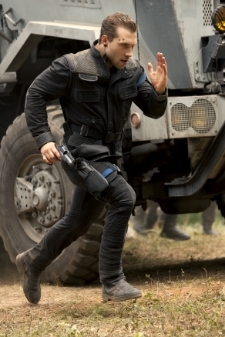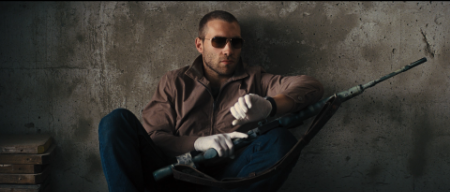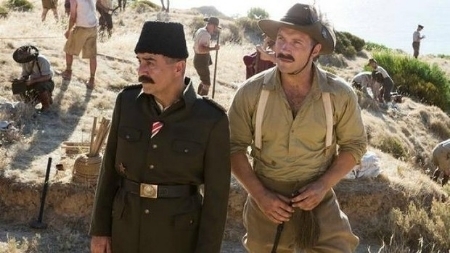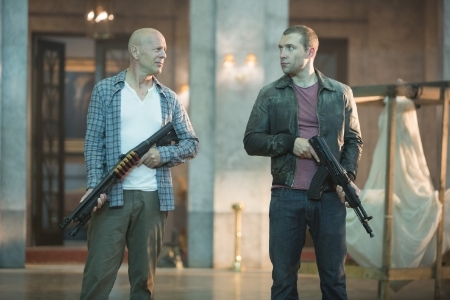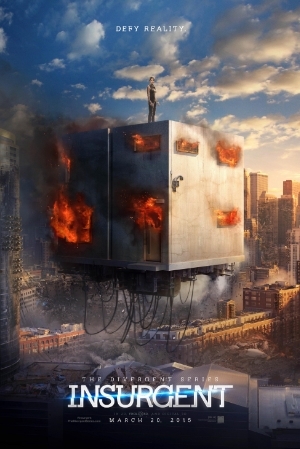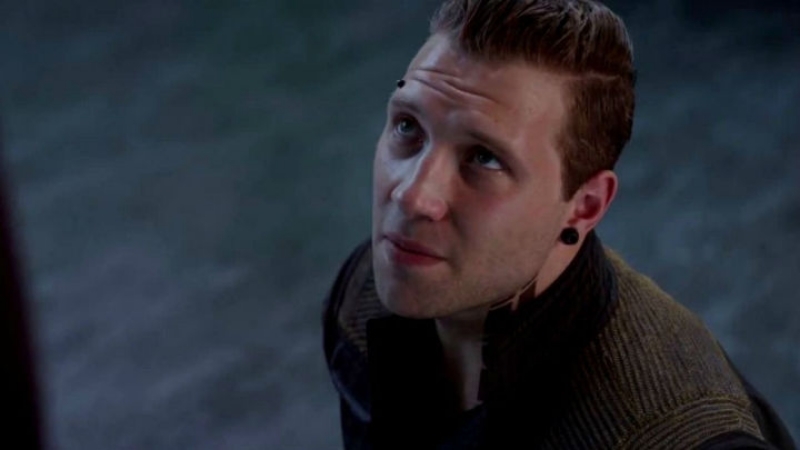
“Insurgent” – Interview with Jai Courtney
by Sara Michelle Fetters - March 20th, 2015 - Interviews
Finding Balance
Jai Courtney On Insurgent, Terminator and Everything In-Between
Jai Courtney isn’t anything like you expect him to be. Returning to the role of Dauntless enforcer Eric in Insurgent, the sequel to last March’s somewhat surprising box office hit Divergent, the actor is a gregarious, plainspoken everyman willing to converse on just about any topic you can imagine. He’s just plain fun to be around, not something you’d initially think considering his action-heavy, shoot first and maybe not ask questions at all roles these past few years.
I sat down with the actor during his recent trip to Seattle about an hour before he was scheduled to take over IMDB’s Twitter account to talk about his return to author Veronica Roth’s futuristic dystopian wasteland. To say he was a little unsure about what was going to happen when he did so was a massive understatement.
“I don’t really know what that means,” laugh Courtney. “It’s going to be a new experience for me. We’ll see how it goes.”
It’s been a wild ride for the actor of late. Since stealing the spotlight in the 2010 miniseries Spartacus: War of the Damned and appearing in a small, if vital, role as a hired thug with orders to take down Tom Cruise’s titular antihero in Jack Reacher in 2012, he’s proceeded to appear in a number of high profile entertainments, including I, Frankenstein and A Good Day to Die Hard. He also took hold of central part in 2014’s Divergent, the movie the first chapter in Roth’s best-selling Young Adult novels.
“To be honest, I had no awareness of the novels,” he admits candidly. “I don’t really fall within the target demographic but then my awareness as to what’s hot at the time isn’t exactly on point. I came around to [Divergent] when the role of Eric was actually offered to me so I got educated real quickly. I started to read the first book. I chatted with Neil Burger, who directed the first movie, and started to get an idea of what this world was and what the character was all about.”
“I knew how successful the novels had been. That caught my attention. I think we’ve all been pretty transparent in saying that, when you see a property that has a built-in success there is an attractive element to that. It piques your curiosity. It’s also the simplest thing, in many ways, in that you look at a property like Divergent and you see an opportunity to be a part of something that will hopefully get a lot of exposure. If you’re not completely selling out to do that, to be a part of something like that, I think it’s smart for a young actor to get on board with something that has this type of breakout potential.”
Not that Courtney wasn’t worried about the character and how he was portrayed in Roth’s books before deciding to be a part of the film adaptations. “I had some reservations,” states the actor flatly. “On the page, in the novel, I was pretty concerned about a few things. Eric didn’t seem like the most multidimensional of characters. There were a lot of discussions with Neil about what that meant and what opportunities there would be to play certain things in the film that could be looked at in a new or different way. If the character was just going to be a complete transplant from what was on the page to what ended up on the screen I don’t think I’d have taken the part.”
“We talked about someone who was a little more conniving and a little less bulldog-ish. We got into Eric’s head and tried to figure out why he was the way that he was, and that started to open up doors that allowed us to layer the performance a little bit more.”
“Look. It’s always a gamble. You never know exactly how these things are going to turn out, especially these larger, bigger budgeted productions. There are a lot of hands in the cookie jar. But I had a ball with the rest of the gang putting that first film together. With that in mind, it was a real privilege to get together with everyone a second time around.”
In Divergent, when we first meet Eric he’s just your typical grunt, your typical soldier. As the story progresses, however, he starts to figure out ways to manipulate those around him, gaining more and more power as he goes along. By the time Insurgent starts he’s a full-blown sociopath, absolutely committed to subjugating all those around him utilizing any and all means – including lethal ones – that are at his disposal.
“He’s not a very nice guy,” chuckles Courtney. “That’s for certain, isn’t it? It’s an interesting thing. I’ve talked a little bit on occasion about finding that menace within Eric, that the inroad for me was to do that in a way that was enjoyable for people to watch so, when he’s not around, you in some odd way kind of miss him. The mistake, I think, that is often made is that when you’re playing a villain you’re just trying to make him nasty and mean, words that aren’t really all that helpful when you’re trying to craft a performance. Eric is those things, yes, but when you’re developing someone who is so evil you need to dig a little deeper than that otherwise it just creates a boring performance. The character doesn’t believe he’s evil, doesn’t think he’s a monster, which in the end I think makes all the heinous things he ends up doing all the more terrifying.”
“I wanted to understand his insecurities. I tried to figure out how those things helped shape who he ultimately becomes. But I’m also able to laugh at him at the same time. I mean, you kind of know this guy from school, right? The insecure bully who masks his shortcomings by being angry and belligerent to those around him. You have to have a little fun playing someone like that, right? It’s the only way I know how to do it. And, if you’re having fun with this character, than that means the audience probably will, too. I love that the feedback I’ve gotten in regards to this character is that people actually like Eric. They hate and despise him, certainly, he’s a total prick, but they love him, too, which to my way of thinking is exactly how it should be.”
It’s easy to see how Courtney could feel this way. Say what you will about either Divergent or Insurgent, but one thing both films do get right is in how they treat their central villains. Eric, as well as the main threat coming after Tris (played by actress Shailene Woodley) and Four (Theo James), Erudite leader Jeanine, once again portrayed by Oscar-winner Kate Winslet, do not think of themselves as evil, do not consider what they are doing to be villainous. Following the old axiom, they truly believe themselves to be the heroes of their own story, the ends justifying the means as far as each as concerned as long as it is done for what they view to be the greater good.
“Exactly,” says the actor. “I did some work on a small film with legendary Australian actor Jack Thompson who told me once that it didn’t matter who or what you were playing, that no matter how small the part or the character’s role in it the story being told is about you. With that in mind, I had to go into these films thinking that both Divergent and Insurgent were films about a man called Eric. That there were his stories until the point he was no longer around. Whenever you’re approaching something that’s the way to go forward; it’s how you find the arc of the character.”
As for how Eric’s journey relates to that found in Roth’s novel, Courtney is well aware some might take exception where new director Robert Schwentke and his trio of screenwriters decided to take things. “It’s always a fine line with these adaptations,” says Courtney. “What do you stay true to? Where do you deviate? Where Eric’s story goes is slightly different than what happens in the book, yes, so it was interesting that they went this particular route, almost make a b-line towards it, in a way.”
“I think it certainly changes how Four is seen as a character, that’s for certain. I also think it perhaps helps change and influence how Theo thinks about things as he moves this character forward deeper into the story. There is a clear decision that is made instead of one that is maybe more just or unavoidable. But, I think from an audience perspective what happens is cooler than a blanket black or white, right or wrong moment. Four has earned the right to make this judgement for himself, and while I think the way things are depicted in the book are probably more just, more morally pleasing, what happens here is in my view far more believable. It’s also just a lot more bad-ass. There’s a respect we end up having for Four because he finally does something of his own volition, does something that isn’t strictly by the book.”
“But, as far as adaptations go, how faithful a film needs to be to its source material, I do think people get so up and arms sometimes about things without affording the filmmakers or the motion picture they’re making the benefit of the doubt. My first real experience with that was, of course, Jack Reacher, and I got to see firsthand how people lambasted Tom about playing that part. People fumed about the fact he was going to play someone who on the page was this six-foot four-inch blonde running back giant of a dude and, I get it, that sort of description does feed a reader’s imagination. But if you take into account the rest of it, the mentality of the character, his nature, his intelligence, how his physicality is only one aspect of who he is, Tom embodied all of those facets, and I think his performance speaks for itself.”
“I do get both sides of the conversation,” he continues. “You can’t abandon things all-together. There’s an appeal to wanting to see, as a reader, what it is you’d dreamt up in your head, to see how things you’ve imagined are ultimately visualized. That’s half the fun. When I read books and scripts I can’t help but imagine actors in those parts, it’s just the way the mind works. But you also have to remember that it is an adaptation, and not everything written on the page is going to work when depicted in a movie.”
At the same time the actor was returning to Insurgent he was also in the process of bringing another favorite character of sci-fi lore to life, John Connor’s time traveling best friend – and father – Kyle Reese. Both this sequel as well as this summer’s Terminator Genisys were filming at the exact same time, Courtney forced to jump back and forth between productions. Ultimately an eight-day window was created for him so he could return to portraying Eric, the transition from embodying a cyborg-fighting hero to a divergent-chasing baddie not near as difficult as one might expect.
“It’s funny,” Courtney laughs. “Somewhat surprisingly it was easy to jump between the two. I had anticipated it would be difficult to go from being the good guy to suddenly the villain once again but it really wasn’t. I had a pretty good handle on Eric. He was a character I felt like I knew pretty well. Now, had he been someone I didn’t know, that I wasn’t comfortable inhabiting, then this might have been a real challenge. But with this group of people, we all have such great camaraderie, so it was east to just plug right back into that sort of muscle memory, if you will.”
“Now, please understand, playing Kyle Reese demanded an awful lot out of me. There’s so much pressure when you take on a character like that. I spent so much time making sure I knew who this guy was, talking with [Terminator Genisys director] Alan Taylor and with Arnold [Schwarzenegger] to make sure I was on the right path. There was also so much physical preparation as the stunts and the action requirements for that film were so incredibly demanding, so as you can imagine preparing for playing him took up a lot of my capacity for generating new character development at that particular time. In that way I was fortunate I was returning to a character like Eric, someone I already knew so well. I’m not sure I could have done both films otherwise.”
Even though post Jack Reacher not everything Courtney has been a part of has met with the same sort of acclaim or success, I, Frankenstein bombed at the box office while A Good Day to Die Hard is looked at by many as a disaster even if the global box office take was hardly meager, appearing in these bigger budgeted productions has allowed him a freedom as an actor he otherwise wouldn’t have been afforded. It’s granted him the opportunity to appear in a relatively minor role in Angelina Jolie’s Unbroken, allowed him to take little to no salary to appear in Russell Crowe’s directorial debut The Water Diviner and work alongside revered veteran Tom Wilkinson in the Australian thriller Felony. This is, without a doubt, all part of the master plan.
“That’s the goal,” he says euphorically. “I want to balance these big budget features with smaller, more intimate character-driven projects. That’s definitely the plan. I don’t really regret jumping on board with any of these bigger studio things but I admit I do yearn for these smaller independent projects. Sometimes, when you’re in the middle of a 100-day shoot on a big action film you can’t help but wish to be in your own suit, doing your own makeup and having absolutely no money and kind of be all guerrilla as you attempt to make a movie. These are often the more enjoyable and the more challenging experiences, without a doubt. You don’t have the budget and the stunts and all the rest of the stuff you do on a studio production but you do get the chance to dig completely and fully into the drama that’s there on the page.”
“Unbroken and The Water Diviner came about as I was really trying to figure out what I wanted to do as an actor. They were representative of this choice I had just made to forget about lead roles, to forget about all this franchise shit; I just wanted to be a part of a sophisticated drama that contained characters who were interesting to me. I mean, Unbroken, my character is on the screen for like three minutes but he’s still important to the story even if he isn’t a particularly big part of it. I hope he’s memorable, especially in the way I was able to bring something to the character, but I didn’t take the role for that reason. I just wanted to be a part of that story. I wanted to be a part of what [director Angelina Jolie] was trying to accomplish. It was a no-brainer.”
“Now, I do understand how this industry works. I get it. These larger films are what has given me the freedom to kind of do more of this sort of stuff and I’m incredibly grateful for the opportunities being in movies like Insurgent and Terminator Genisys has afforded me. There’s stuff being made back in Australia and I want to be a part of that, to go home and do some of those films when possible. I want to work with those young, cool edgy filmmakers. The idea is to be in control of this to some extent, for certain, but you also have to pay the rent and, in all honesty, I still feel very new to all of this and am still trying to navigate my way through everything in a way that makes sense both from a creative artistic standpoint and from the aspect of a working actor.”
With that in mind, it’s easy to wonder how much attention Courtney pays to how critics and audiences react to his performances in films. “You can’t help but have some awareness how people are reacting to what you’ve done,” he admits. “It’s bullshit to think otherwise. You can’t not care what people think. You have to care; it’s why we’re in this business. But you can also get buried in it at the same time, so you have to let it all – good, bad, in-between – wash over you otherwise you’ll never take another role or be a part of another movie.”
“I’ve certainly made the mistake of taking it all too personally. When A Good Day to Die Hard came out, of course I wanted everyone to love it; of course I wanted it to be awesome. I wasn’t unaware that the fourth film [Live Free or Die Hard] was terrific and without question we wanted to top it, and unfortunately in the end I don’t think that was the case. It didn’t happen. But, when I say that, you also have to be aware that I can’t speak for the fans that did like that movie. Then you’re alienating people who were onboard with it. I get recognized for Die Hard more than I do anything else and I’ll have conversations where I like brush it off, where I’m almost too self-deprecating, where my ego says to not measure me by what I did in that movie. And people get all angry because they did like it, and so in the end it isn’t for me to say whether they can enjoy it or not, to not take that away from them.”
“I think it’s ultimately about having a healthy balance. Anyone in our business knows you can’t knock them all out of the park. Look, I think I’m pretty realistic. I’m lucky to be able to do what it is I do for a living and I want to keep doing it. You have to have some caution and you have to be aware of what people think but at the same time you can’t design your entire career around trying to keep everyone happy. You don’t want to saturate your audience with the same sort of thing and you want to stretch yourself as an actor. But, most importantly, you have to keep working, and work begets work. That’s really all there is to it.”
Interview reprinted courtesy of the SGN in Seattle
